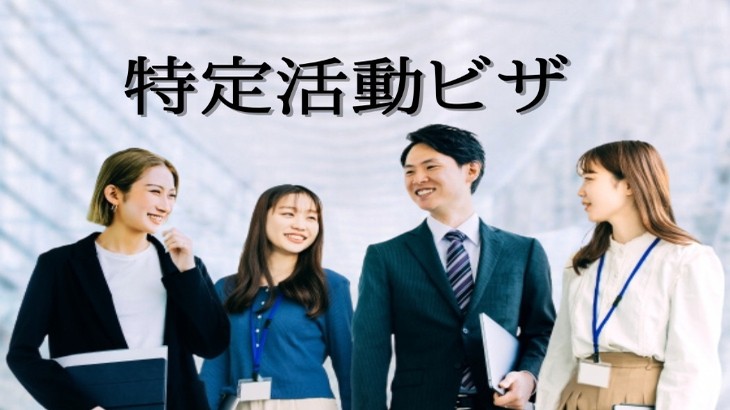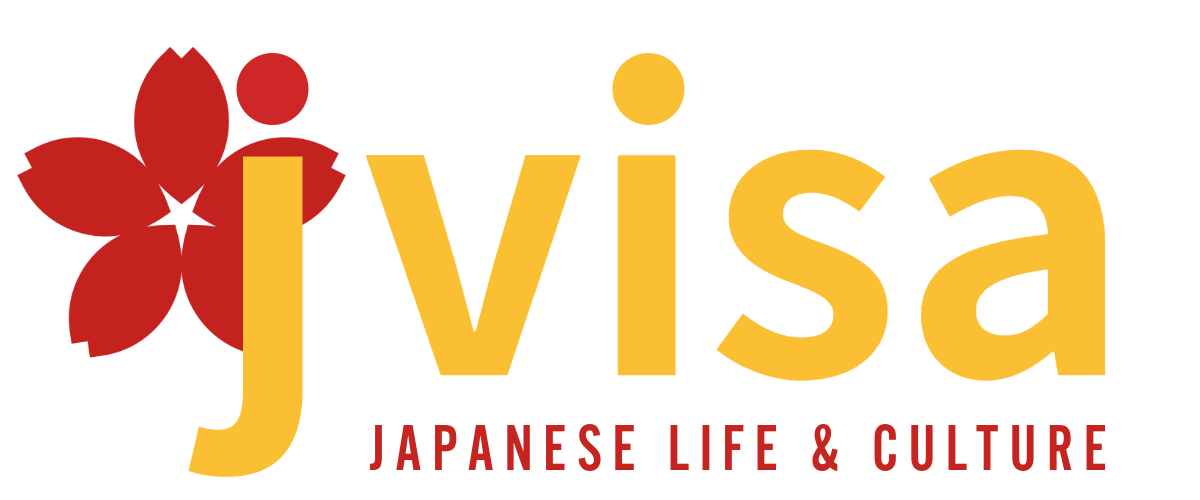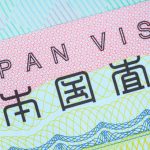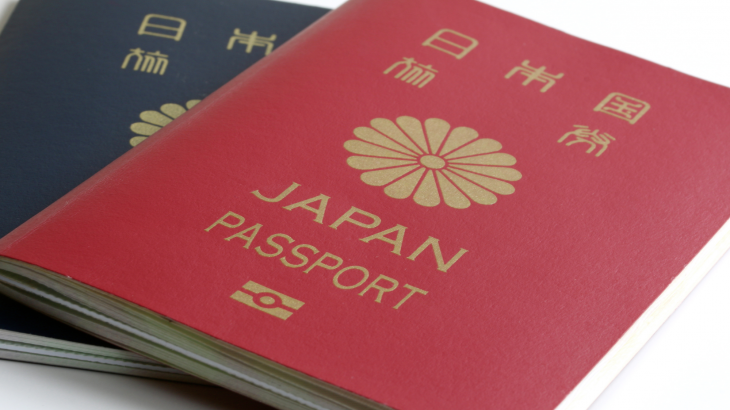If you are studying and working in Japan or if you are exploring the idea of going to Japan, recently you might have heard about the concepts of Tokutei Gino Visa and Tokutei Katsudo Visa. Do you know what Tokutei Katsudo Visa is and what its benefits are?
In this article, jvisa will provide more specific information about Tokutei Katsudo Visa, its advantages and disadvantages as well as guidance on how you can apply for this visa most effectively.

What is Tokutei Katsudo Visa?
Tokutei Katsudo Visa (Special Activities Visa) is a type of visa specifically designated by the Japanese Ministry of Justice for individual foreigners according to the Immigration Control and Refugee Recognition Act. In other words, Tokutei Katsudo Visa is an “alternate residency status” outside of the existing residency status, and its characteristic is the diversity in its types.
Since Tokutei Katsudo Visa program has expanded its eligibility criteria, determining who qualifies for the visa has become a matter of great interest, especially for Vietnamese individuals living and working in Japan. So, who is eligible to be granted Tokutei Katsudo Visa?
Individuals who qualify for Tokutei Katsudo Visa include:
- Those with student visas, pursuing regular courses at universities, short-term colleges, vocational schools, graduate schools, etc. but have not yet found employment in Japan.
- Interns who have completed their 3-year program but, due to the Covid-19 pandemic cannot return to their home country.
- Foreigners with other types of work visas who have been terminated from their jobs or are facing difficulties in continuing their employment.
- Students whose work invitations have been canceled.
- Additionally, other groups granted the Tokutei Katsudo Visa include amateur athletes and their families, caregivers, EPA (Economic Partnership Agreement) care workers, cultural exchange interns, international performers, descendants of Japanese or foreigners of Japanese descent, ski instructors, etc.
Types of Tokutei Katsudo Visa
Below, Jvisa will introduce special activity visas that international students who have graduated from universities in Japan can use.
Tokutei Katsudo Visa for students Type 1

Foreigners with a “student visa” studying in regular courses who have graduated from vocational schools or universities and wish to stay in Japan to continue their job search activities they had been conducting prior to graduation.
Note that if the validity of your student visa still has a few months left, many people wonder whether they should both search for jobs and work part-time until the visa expires. However, the reality is not as you might think. When you graduate from a vocational school or university in Japan, your residency status under the student visa automatically ends, meaning you cannot continue your part-time job of 28 hours per week as before. Therefore, you are required to switch to the Tokutei Katsudo Visa to continue your job search activities in Japan.
Tokutei Katsudo Visa for students Type 2
For individuals who have decided on their workplace while still studying or after graduation and wish to stay in Japan until they are recruited. Specifically, if you have found a job while still studying or after graduation, but the start date for joining the company is set for September, there will be a gap period until the commencement date. In cases where switching to an immediate work visa is not possible, you can apply for residency status under Tokutei Katsudo Visa (for employees with naitei) along with the necessary documents provided by the company.
Tokutei Katsudo Visa for students Type 3 ( Tokutei Katsudo Visa No. 46 )
Tokutei Katsudo Visa No. 46 is a residency status that allows you to stay in Japan with special permission from the Ministry of Justice to engage in activities not permitted under other residency statuses.
Tokutei Katsudo Visa No. 46 is limited to university graduates, individuals who have completed a master’s program in Japan with high proficiency in Japanese such as JLPT N1 or BJT with a score of 480 or higher. Katsudo No. 46 Visa functions to facilitate flexible employment activities in Japan after graduation.
This residency status was established in May 2019 with the aim of expanding employment opportunities for international students, allowing them to engage in simple jobs (service and manufacturing) that were previously not covered by residency statuses.
At present, there are over 50 designated activities, and the permitted activities vary for each type.
(Ministry of Justice: Residency Status List)

Permissible jobs for Tokutei Katsudo Visa No. 46
- Operating and managing websites in the manufacturing industry
- Customer service in restaurant hospitality
- Retail sales and customer care
- Customer service in hotels & ryokans, website translation
- Taxi driver
- Healthcare facility caregiver
To be eligible for Tokutei Katsudo Visa No. 46, you need to:
- Apply the knowledge acquired through studying in Japan
- Be a full-time employee
- Be employed at a salary level equal to or higher than that of Japanese nationals
- Engage in a job that requires communication in Japanese
Please check if you meet the conditions before submitting your application. You can also refer to more official information from the sources below:
★ 留学生の就職支援に係る「特定活動」(本邦大学卒業者)についてのガイドライン
★ 在留資格「特定活動(告示46号)」
(Source: Ministry of Justice of Japan)
Tokutei Katsudo Visa for students Type 4

This is a type of Tokutei Katsudo Visa for university graduates in Japan who wish to start their own businesses. This visa allows international students who have completed their bachelor’s or master’s degrees at Japanese universities to apply within 6 months after graduation. If you meet the requirements, you can apply to extend this visa after 6 months.
Foreigners wishing to start a business in Japan can apply for the Tokutei Katsudo Visa for 6 months if they meet certain conditions, such as managing and supporting entrepreneurial activities in collaboration with local authorities, without the need to graduate from a Japanese university.
※ Notice: In the case of graduating from the International Student Job Placement Promotion Program (留学生就職促進プログラム選定校) and the Top Global University Project (スーパーグローバル大学創成支援事業採択校), your maximum residency period will be extended to 2 years.
Furthermore, foreigners wishing to start a business in Japan but not graduating from a Japanese university can still apply for a 6-month residency period. As long as you meet certain conditions such as managing/ supporting entrepreneurial activities in collaboration with local authorities. The residency period can be extended up to 1 year.
The procedure to apply for Tokutei Katsudo Visa
To participate in the Tokutei Katsudo Visa program in Japan, you need to prepare the following procedures and documents:
To apply for the residency status conversion, you’ll need to prepare the following documents:
- Household registration book
- Passport and permanent resident card (if applicable)
- Passport-sized photos (3×4 cm): Clearly write your name on the back, then affix to the designated section of the residency status conversion application form. The photos must be taken within the last 3 months with a plain background.
- Residency status conversion application form (obtainable locally or from the website of the special visa conversion procedure).
- Proof of financial capability to cover expenses during the stay. If the financial sponsor and the applicant are not the same person, you’ll need a proof of financial capability from the sponsor and proof of the relationship with the sponsor.
Notice: If your documents are not in Japanese, you’ll need to provide a Japanese translation. Submitted documents will not be returned, so if you have important papers, consider making copies for your records.
In the case you are a university student, college student or professional school student, you will also need to provide the original or a copy of your university diploma, a letter of recommendation stating your desire to stay in Japan for work and any relevant documents related to your studies.
For Senmon graduates, you’ll need to prepare the following documents:
- Passport and residence card.
- Visa application form.
- Academic transcripts from the Senmon school.
(Reference: Necessary documents)
After preparing all the necessary documents, you need to submit them to the local immigration office where you reside. For those in the Tokyo area, you can submit them to the Tokyo Immigration Bureau. These agencies will then review and issue the visa. The deadline for submitting the application is calculated from the graduation date to the expiration date of the residency status.
Advantages and disadvantages of Tokutei Katsudo Visa
Advantages of Tokutei Katsudo Visa
When you are granted a Tokutei Katsudo Visa, you will receive many benefits. For example:
- Diversity: It encompasses various activities, allowing you to stay in Japan for various purposes, including employment, training, and entrepreneurship.
- Flexibility: Designed to participate in specific activities, providing flexible conditions compared to other types of visas.
- Extension capability: The possibility to extend the duration of stay if the conditions are met. This allows you to engage in long-term projects and activities.
- Employment opportunities: Provides time for you to continue job hunting after graduation until finding employment.
Disadvantages of Tokutei Katsudo Visa
Although there are many advantages, the Tokutei Katsudo Visa also has certain disadvantages, such as:
- Stringent requirements: Not all foreigners can apply due to specific qualifications and levels of expertise required.
- Complex application process: The application process can be complex with many necessary documents and procedures.
- Limited scope of activities: You are restricted to activities permitted by your visa and cannot engage in any activities beyond that scope.
- Renewal requirements: You may need to renew your visa periodically and each renewal requires meeting certain conditions.
The difference between Tokutei Katsudo Visa and Tokutei Gino Visa
If only by name, probably 80% of people would think these are the same type of visa. However, they are two different types with very different characteristics. Specifically:
Tokutei Katsudo Visa
- Diverse purposes of use: Issued to foreigners residing in Japan for specific purposes such as research, education, business, cultural activities.
- Flexibility: Applicable in various situations based on activities and the length of stay adjusted accordingly.
- Extension: The visa can be extended if the conditions are met.
Tokutei Gino Visa
- Responding to the labor market: Targeting foreign workers in specific industries experiencing labor shortages such as nursing care, construction and agriculture.
- Skill and experience requirements: Specific skill levels and relevant field experience are required.
- Limited extensions: Technical Intern Trainees with Skill Type 1 can be extended for a maximum of 5 years, while Technical Intern Trainees Skill Type 2 can be extended longer, requiring higher-level skills.
Summary
Currently, the number of Vietnamese people living and working in Japan is increasing. Along with that, the Japanese government has also established various types of visas suitable for each industry and specific purposes of stay. Through this article, we hope that you will have a clearer understanding of the Tokutei Katsudo Visa and make the most thorough preparations when applying for this visa.









